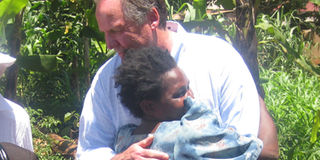An HIV positive widow’s struggle to survive against all odds

Joyce Bonabana embraces a visiting Kibo delegate. Kibo is an NGO in Kansanga that gave her the sewing machine from which she earns some money to feed her family.
What you need to know:
Joyce is HIV positive and looks after eight children. She spoke to Stella Nakakande about her ups and downs of life as a widow without a stable place to call home.
Joyce is HIV positive and looks after eight children. She spoke to Stella Nakakande about her ups and downs of life as a widow without a stable place to call home.
Joyce Bonabana is a small bodied woman, dressed in a gomesi that is hanging off her body, she wears a nose pin and from the looks of it, she was once a very attractive woman. With a fair complexion, the traces of beauty are there although life has taken its toll on her. One look at her 15-year-old daughter Aidah Katusiime confirms this though; she is her mother’s child.
Buziga hill where she resides is famous for its posh residential houses. One would not expect to see a shack anywhere in this area. But on the first turn off down the road from Ggaba on the way to Munyonyo, another of Kampala’s posh suburbs resides Joyce in a mud and wattle house on the right, as one goes further uphill.
Joyce is HIV positive and looks after eight children, seven of them hers and the eighth her deceased sister’s son. Her daughter, Katusiime is also HIV positive and so is her nephew. Her last born is between two and three years.
All nine family members live in this small house measuring about 1x1 metre on a piece of land given to her temporarily by the LC.1 chairman, adjacent to a neighbour’s garden. On the inside, the walls of the house are lined with newspapers and cut out pictures of musicians, quite typical of teenagers. There are clothes, neatly stacked in one corner and others scattered here and there. The house boasts of one bed.
Adjoined to it is a wooden structure just a few inches longer than the wattle house, it used to be the place where they stayed. The wooden structure blocks the wattle house’s view if one is on the main road. The house is separated from the murrum road by a small stream of water, and a shaky narrow wooden bridge. On the dry sunny day I was there, nothing could keep the dust away.
Joyce’s story begun close to three years back when her husband fell sick. “Twali tusula mumuzigo (we were renting at the time),” she says. They were endless months of sickness that finally had him admitted in Mulago Hospital. He was found to be HIV positive and died shortly after.
Joyce didn’t bury her husband though. “I left his body in Mulago so that he would be buried in Lusaze (burial site for unidentified bodies and those without relatives in Kampala), I could not afford to transport the body.” They hail from Kasese in western Uganda. His death impacted on their lives in the worst of ways. First it was his absence they missed, and then they were homeless. The landlord‘s sympathies had run out, he chased them from the one-roomed house they were renting after about six months.
With no one to turn to, she approached her area L.C.1, she needed somewhere to stay. At the time, there were only seven children until her sister passed on and left her son parentless. “I was his only relative. So I had to look after him.” She had a big family and times were hard, having two meals a day was luxurious, they had only enough for a meal and that is when they got it. This compromised her health, with the HIV status and that of her children, it is imperative that one feeds well as a way of boosting their immunity and preventing susceptibility to opportunistic infections.
But as luck would have it, some students doing community service from Kibo, an NGO, in Kansanga came by a year ago. They had been referred by St. Padre Pio Community in Ggaba, the centre that gives her and her family Anti Retroviral Drugs (ARVS). They had been told that she was one of the women who needed help.
Joyce was given a sewing machine because she had earlier told them about her tailoring skills. And she had something to show for it, a year after. She brought out one of her designs, a red and black eye catching outfit she had made for herself. “I had a contract with a school, I was making uniforms for them,” she says, “but the contract has since been stopped.” I can make many designs, my only problem is that I lack materials,” she added, “but at least I manage to feed my children and send them to school although they miss out some years because of lack of school fees.” Her 14-year-old son is in P.6 despite the fact that he is meant to be in S.2.
Without the contract and no materials, she currently mends people’s clothes, which does not bring in as much money as the contract. The business is now sluggish. On other days, she is just too weak to get on the machine and sew, so her daughter Katusiime does the work.
“When I am feeling strong, I teach my children and their friends to tailor; many children come here just to learn that.” She does not charge any money though, she gives the skill away freely, giving as she was given with the hope that one day her business will flourish and her children will have a better life, one of not worrying about their school fees or the day’s meals.
For any assistance to Joyce, contact Kibo, an NGO in Kasanga on 0717536738.




